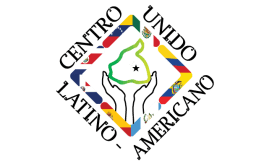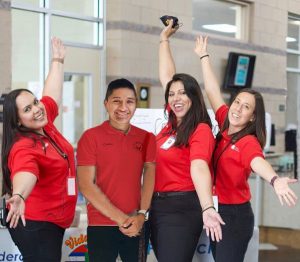Margarita, the executive director of Centro Unido Latino-Americano (CULA) in McDowell County, knows a thing or two about traditions. Coming from a Latino family with a Mexican immigrant mother, Margarita holds many family and cultural traditions close to her heart. However, there’s one that she’s trying to change – not talking about mental health.

“We have been generation through generation with this stigma about mental health,” said Margarita. “It’s time for someone to stand up and say, ‘This is what mental health is, we need to get educated, we need to address the issue, we need to know what our young people are going through, and we need to talk to them about it.’”
When Margarita became the executive director at CULA, a non-profit organization that works to serve the Latino community, the only program was a food pantry serving 100-200 people a month. Having grown up in the county, she built strong relationships and understands the struggles and barriers the Latino community face on a daily basis. With this background, she created programs to reach more people. Less than two years after she started, CULA has more than nine programs serving 800-1,400 people a month and has increased staff from three to nine.
“My dedication to CULA comes from the urge to create a change and break the systemic barriers affecting the Latinx community,” said Margarita. “Having the platform of CULA and building different relationships and partnerships allowed me to reach members that have never been reached by CULA before.”

Margarita made mental health the next expansion program for CULA, and that is made possible by a partnership with Vaya Health. Although Margarita and several of her staff members took the Mental Health First Aid course through the National Council for Mental Wellbeing, they noticed the lack of availability for mental health trainings in Spanish. Being able to speak in their native language to providers was something the local community already struggled with.
“Sometimes there’s an offer of having a translator where the client speaks to a therapist through the translator, but there’s the issue of things not being communicated exactly correctly,” said Kelly Wolf, Vaya Health System of Care project director. “Then there are people who are already reticent about sharing that kind of information and being that vulnerable with someone, and now you have to be vulnerable with two people instead of just one. You might also know that translator. This is a tiny community where there’s not a lot of Spanish speakers.”
Vaya’s System of Care (SOC) Expansion and Sustainability Grant, funded by the Substance Abuse and Mental Health Services Administration, stepped in to help in an innovative way. The SOC grant expands services and access to care for families and youth with mental, behavioral, or emotional disorders in seven western North Carolina counties, including McDowell. Kelly and her team came up with a way to provide trainings in Spanish: Margarita and her staff would become the trainers.
“They just want to have this opportunity to be able to meet the needs of the community members, and I think that’s where the partnership with Vaya comes in,” said Kelly. “The grant services in the communities should be sustainable. Vaya can provide and fund trainings, but ideally we’re going to plant instructors directly in the community who already live and work there to provide the trainings themselves.”
This partnership in training new trainers also meets the SOC grant initiatives of reaching and serving historically marginalized populations. In a community where there are no Spanish speaking providers, Margarita and three of her staff members are now certified trainers in Youth Mental Health First Aid and QPR (Question, Persuade, Refer) Suicide Prevention.
“I think sometimes people just want somebody to listen in their own language,” said Margarita. “That’s something we learned in the training – maybe someone just wants you to listen. They just need an ear.”
The trainings will help CULA and the community on all different levels, from youth to adults, and even outside of McDowell County. After receiving the trainings, CULA launched a program called Healthy Minds of CULA. CULA also launched a youth program, a piece of which will focus on mental health, in January 2022 called Vamos (meaning “let’s go” in English). Mental health will also be incorporated into existing programs, including having separate mental health forums for youth and parents. They also have a community health worker working with members about COVID-19 who will now also address mental health in the same meetings.
Through the SOC grant, Kelly has contracted with the National Council for Margarita and her team to take the Teen Mental Health First Aid training. Once certified, the trainers will train youth (grades 10-12) on how to recognize and respond to mental health crisis with their peers.
“Youth are way more likely to look to their peers for help when they’re experiencing mental health distress than to go to a school counselor or any other adult,” said Kelly. “This training responds to that. It tells them what to look for, what to say, what to do, and how to try and convince them to go to an adult.”
In addition, when an organization in Alamance County that works with an historically marginalized community requested more trainings from Kelly, she saw it as a great opportunity for Margarita and her team to begin leading trainings. Being able to hold them virtually means they can reach a much larger range than just McDowell County.
Although the Healthy Minds of CULA program is new to the community, that doesn’t mean Margarita has not seen the difference it has made in her community. They’ve already helped a community member who was experiencing suicidal thoughts and were able to connect them to the RHA Crisis Line where they received the help they needed.
“That just shows you the need that the Latinx community has,” said Margarita. “Sadly, our tradition is not to talk about mental health. My parents were educated this way, and it’s a cultural thing. It becomes a cycle, and you have to be the brave one to say, ‘I’m going to break this.’ In order to do that, I needed these kinds of trainings. To unlearn something and learn new ways is really hard, but these trainings have given me the knowledge to do that and I’m forever thankful. With the community, I think there’s going to be a lot of cases like me that are tired of this cycle and want to break it. Parents will have better communication with their kids. They’re going to be able to identify when youth are going through depression or anxiety or a bigger crisis that needs immediate attention. It will all make a really big difference in our community. I think this is just the beginning.”



